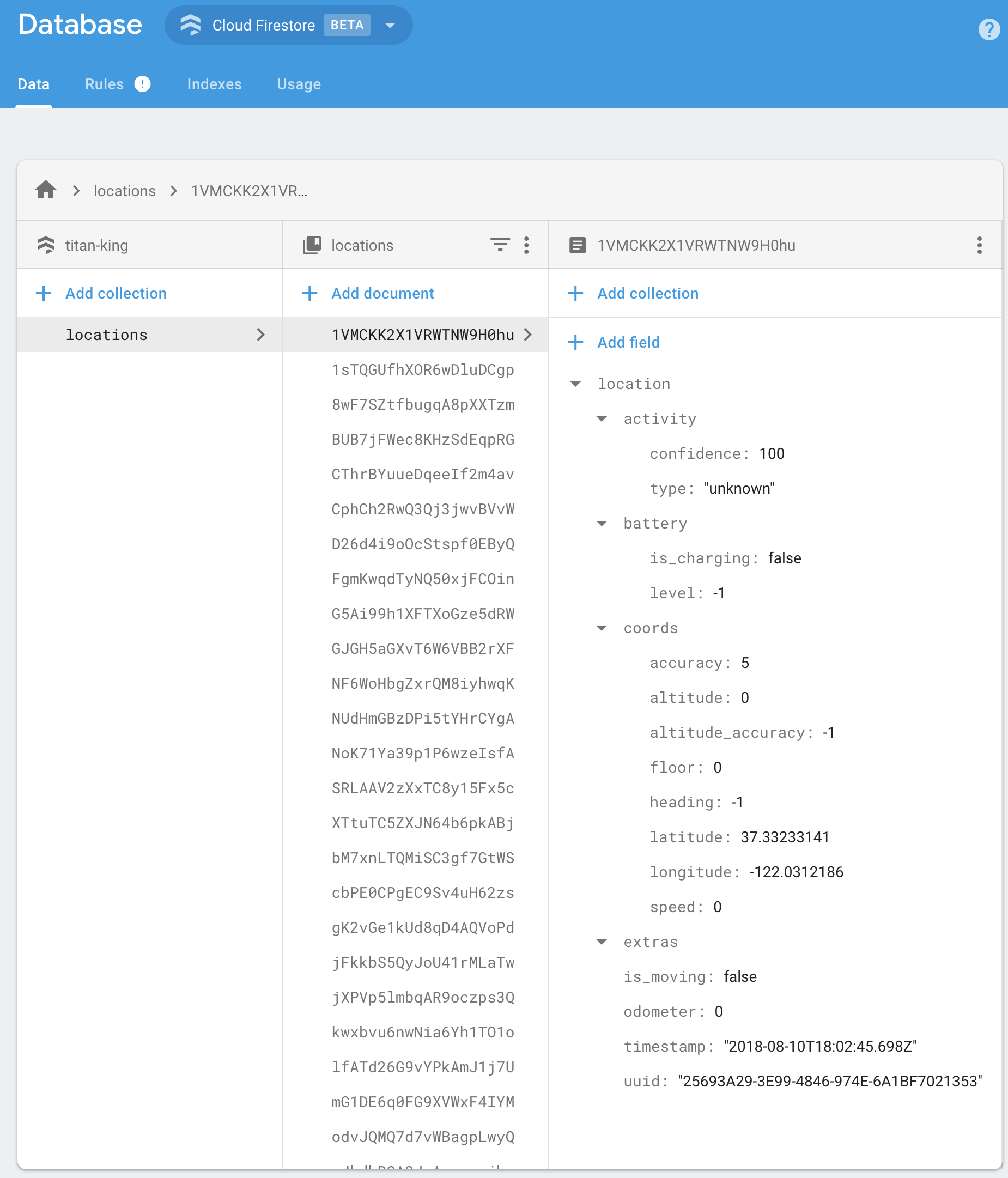Firebase Proxy for BackgroundGeolocation Native SDK. The plugin will automatically post locations to your own Firebase database, overriding the background-geolocation SDK's SQLite / HTTP services.
The Android module requires purchasing a license. However, it will work for DEBUG builds. It will not work with RELEASE builds without purchasing a license.
You will have to install the plugin by manually downloading a Release from this repository. The plugin is not currently submitted to a package manager (eg: jCenter)
Create a folder in the root of your application project, eg: /Libraries and place the extracted background-geolocation-firebase folder into it:
eg: 📂 Libraries/background-geolocation-firebase
-
Login to Customer Dashboard to generate an application key: www.transistorsoft.com/shop/customers
-
Add your license-key to
android/app/src/main/AndroidManifest.xml:
<manifest xmlns:android="http://schemas.android.com/apk/res/android"
package="com.transistorsoft.backgroundgeolocation.firebasedemo">
<application
android:name=".MainApplication"
android:allowBackup="true"
android:label="@string/app_name"
android:icon="@mipmap/ic_launcher"
android:theme="@style/AppTheme">
<!-- background-geolocation-firebase licence -->
+ <meta-data android:name="com.transistorsoft.firebaseproxy.license" android:value="YOUR_LICENCE_KEY_HERE" />
.
.
.
</application>
</manifest>#import "ViewController.h"
@import TSLocationManager;
#import "BackgroundGeolocationFirebase.h"
@interface ViewController ()
@end
@implementation ViewController
- (void)viewDidLoad {
TSLocationManager *bgGeo = [TSLocationManager sharedInstance];
TSConfig *config = [TSConfig sharedInstance];
// Get a reference to BackgroundGeolocationFirebase adapter
BackgroundGeolocationFirebase *firebaseAdapter = [BackgroundGeolocationFirebase sharedInstance];
// Configure firebase adapter as desired.
firebaseAdapter.locationsCollection = @"locations"; // <-- "locations" is default
firebaseAdapter.geofencesCollection = @"geofences"; // <-- "geofences" is default
firebaseAdapter.updateSingleDocument = NO; // <-- NO is default
// Register the Firebase adapter with BackgroundGeolocation
[config registerPlugin:firebaseAdapter.name];
// Continue implementing BackgroundGeolocation as normal
[config updateWithBlock:^(TSConfigBuilder *builder) {
builder.debug = YES;
builder.logLevel = tsLogLevelVerbose;
}];
[bgGeo ready];
[bgGeo start];
[super viewDidLoad];
}
@end
public class MainActivity extends AppCompatActivity {
@Override
protected void onCreate(Bundle savedInstanceState) {
super.onCreate(savedInstanceState);
////
// Get a reference to TSFirebaseProxy
//
TSFirebaseProxy firebaseProxy = TSFirebaseProxy.getInstance(getApplicationContext());
// Configure the TSFirebaseProxy
firebaseProxy.setLocationsCollection("locations"); // <-- "locations" is default
firebaseProxy.setGeofencesCollection("geofences"); // <-- "geofences" is default
firebaseProxy.setUpdateSingleDocument(false); // <-- false is default.
// Register the TSFirebaseProxy
firebaseProxy.register(getApplicationContext());
// Continue implementing BackgroundGeolocation as normal
final BackgroundGeolocation bgGeo = BackgroundGeolocation.getInstance(getApplicationContext(), getIntent());
final TSConfig config = TSConfig.getInstance(getApplicationContext());
// Configure the SDK:
config.updateWithBuilder()
// Configure Debugging
.setDebug(true)
// Configure Geolocation
.setDesiredAccuracy(LocationRequest.PRIORITY_HIGH_ACCURACY)
.setDistanceFilter(50f)
.commit();
// Finally, signal #ready to the plugin.
bgGeo.ready(new TSCallback() {
@Override public void onSuccess() {
TSLog.logger.debug("[ready] success");
if (!config.getEnabled()) {
bgGeo.start();
}
}
@Override public void onFailure(String error) {
TSLog.logger.debug("[ready] FAILURE: " + error);
}
});
}
}BackgroundGeolocation will post its default "Location Data Schema" to your Firebase app.
{
"location":{},
"param1": "param 1",
"param2": "param 2"
}You should implement your own Firebase Functions to "massage" the incoming data in your collection as desired. For example:
import * as functions from 'firebase-functions';
exports.createLocation = functions.firestore
.document('locations/{locationId}')
.onCreate((snap, context) => {
const record = snap.data();
const location = record.location;
console.log('[data] - ', record);
return snap.ref.set({
uuid: location.uuid,
timestamp: location.timestamp,
is_moving: location.is_moving,
latitude: location.coords.latitude,
longitude: location.coords.longitude,
speed: location.coords.speed,
heading: location.coords.heading,
altitude: location.coords.altitude,
event: location.event,
battery_is_charging: location.battery.is_charging,
battery_level: location.battery.level,
activity_type: location.activity.type,
activity_confidence: location.activity.confidence,
extras: location.extras
});
});
exports.createGeofence = functions.firestore
.document('geofences/{geofenceId}')
.onCreate((snap, context) => {
const record = snap.data();
const location = record.location;
console.log('[data] - ', record);
return snap.ref.set({
uuid: location.uuid,
identifier: location.geofence.identifier,
action: location.geofence.action,
timestamp: location.timestamp,
latitude: location.coords.latitude,
longitude: location.coords.longitude,
extras: location.extras,
});
});The collection name to post location events to. Eg:
Eg:
"/locations""/users/123/locations""/users/123/routes/456/locations"
The collection name to post geofence events to. Eg:
Eg:
"/geofences""/users/123/geofences""/users/123/routes/456/geofences"
If you prefer, you can instruct the plugin to update a single document in Firebase rather than creating a new document for each location / geofence. In this case, you would presumably implement a Firebase Function to deal with updates upon this single document and store the location in some other collection as desired. If this is your use-case, you'll also need to ensure you configure your locationsCollection / geofencesCollection accordingly with an even number of "parts", taking the form /collection_name/document_id, eg:
Eg:
"/locations/latest" // <-- 2 "parts": even"/users/123/routes/456/the_location" // <-- 4 "parts": even
"/users/123/latest_location" // <-- 3 "parts": odd!! No!
The MIT License (MIT)
Copyright (c) 2018 Chris Scott, Transistor Software
Permission is hereby granted, free of charge, to any person obtaining a copy of this software and associated documentation files (the "Software"), to deal in the Software without restriction, including without limitation the rights to use, copy, modify, merge, publish, distribute, sublicense, and/or sell copies of the Software, and to permit persons to whom the Software is furnished to do so, subject to the following conditions:
The above copyright notice and this permission notice shall be included in all copies or substantial portions of the Software.
THE SOFTWARE IS PROVIDED "AS IS", WITHOUT WARRANTY OF ANY KIND, EXPRESS OR IMPLIED, INCLUDING BUT NOT LIMITED TO THE WARRANTIES OF MERCHANTABILITY, FITNESS FOR A PARTICULAR PURPOSE AND NONINFRINGEMENT. IN NO EVENT SHALL THE AUTHORS OR COPYRIGHT HOLDERS BE LIABLE FOR ANY CLAIM, DAMAGES OR OTHER LIABILITY, WHETHER IN AN ACTION OF CONTRACT, TORT OR OTHERWISE, ARISING FROM, OUT OF OR IN CONNECTION WITH THE SOFTWARE OR THE USE OR OTHER DEALINGS IN THE SOFTWARE.


